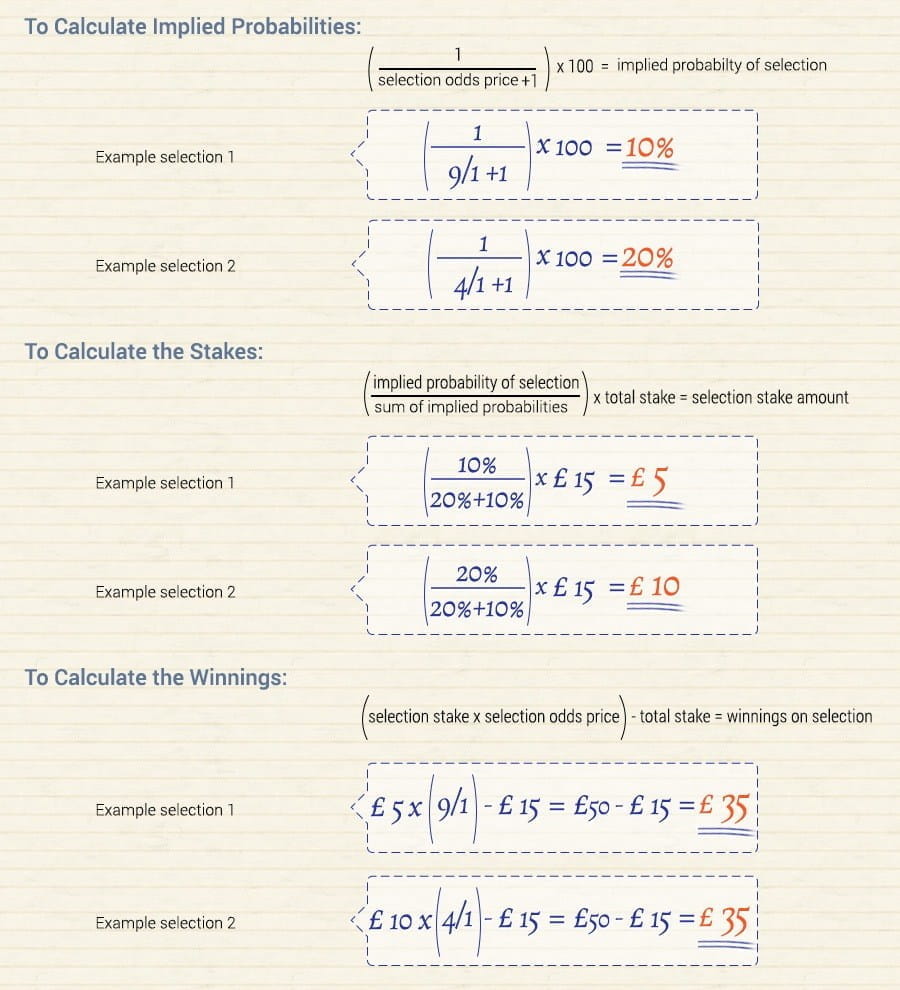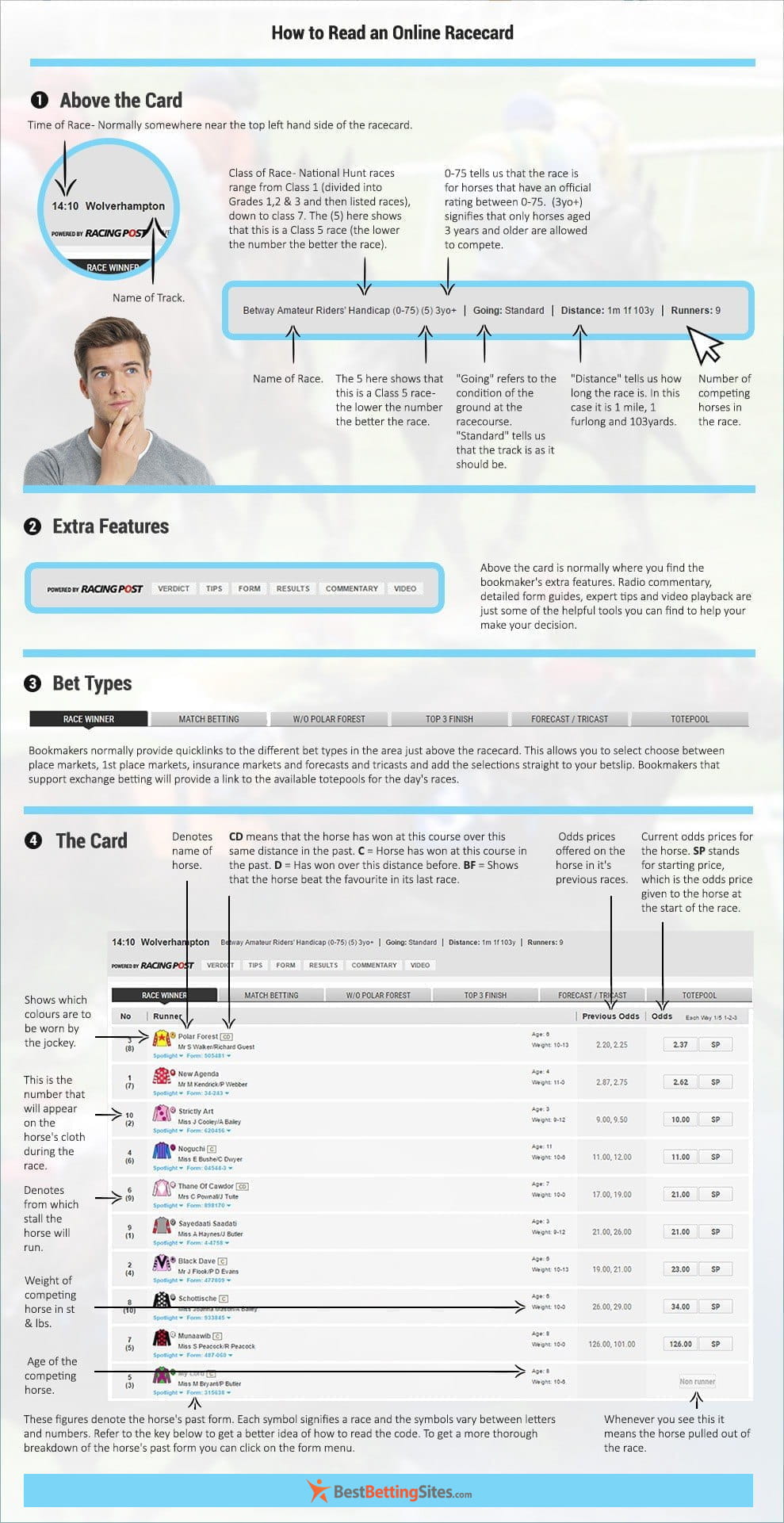Famous Horse Racing Betting Strategies
 Many punters choose to opt for a more strategic approach to betting on horses in order to try and seek out the best value in the market. There are a number of widely recognised betting systems that can, if used properly, can increase your expected value. Here are some of the most well-known, well tested horse racing strategies listed below.
Many punters choose to opt for a more strategic approach to betting on horses in order to try and seek out the best value in the market. There are a number of widely recognised betting systems that can, if used properly, can increase your expected value. Here are some of the most well-known, well tested horse racing strategies listed below.Dutching
Dutching is a popular betting system that basically ensures that when you wager on a certain number of horses you make the same amount of money irrespective of which horse actually wins. It does involve a fair bit of maths; however, it can be extremely useful if you have a set amount you wish to stake and you want to back more than one selection. For the system to be effective you need to first decide how much you’re willing to bet, and then work out how you can split your stake so that you guarantee a profit however the race pans out.
Dutching Formula
Say, for instance, you see two selections with odds prices of 9/1 and 4/1 and you’re prepared to wager £15.

Say for instance you see two horses with odds prices of 9/1 and 4/1 and you’re prepared to wager £15. The temptation would be to split this bet 50-50 so that you wager £7.50 on horse A and £7.50 on horse B. However, with the dutching strategy as shown above, you can work out how exactly how much you need to stake to cover both outcomes and ensure the same profit.
Laying the Favourite
Laying the favourite is when you bet against the favourite to win a race in a betting exchange. It is a strategy that at first instance appears to go against the very basic principles of gambling, but if used properly, can ensure profits over time. Gambling statistics show that only 1/3 of favourites actually end up winning a race. This means that on average, favourites are more likely to lose a race than they are to win. You need to think, in betting exchanges a horse is only perceived as the favourite because it has the most amount of money behind it, not necessarily because it has the best chance of winIBAS
- For this strategy to work you need to firstly only consider laying a favourite that’s trading at 3/1 or below; any more than this and the damage to your bank roll if the selection actually does end up winning will be felt.
- Secondly, you need to really need to have your handicapping techniques down to a tee to really be able to identify the weak favourites in a race. As a starting point, you can refer to points 2-9 in the handicapping section of our horse racing betting guide. There are however a number of other factors that should be considered, such as whether or not the horse is running in a national hunt race for the first time, if it’s carrying any excess weight, or whether or not it’s wearing blinkers/headgear for the first time. Take your time, dissect the favourites’ form guide and apply your handicapping techniques. If you’re pretty certain that there’s another horse in the race that can beat it and the odds are looking short there’s a good chance it makes for a good lay bet.
- Third, you need to know when not to lay the favourite. To stay on the safe side, we generally say that you should stick to the top racing classes, i.e. Group 1 Grade 1 races. Why? Firstly, because bookmakers tend to offer more in-depth form records of the competitors in the higher tier races, which makes it easier to sport a weak favourite. And second because the exchanges on top tier races tend to have more first time, inexperienced punters who are more inclined to bet on the favourite, and thus bring the prices down. If you’d like to learn more about betting exchanges, head over to the exchange betting info section on the main sports betting page.
Value Betting
Value betting is a more general betting strategy that does not apply exclusively to horse racing, but is nonetheless important for maximising profits over time. It is, essentially, when you look to see if a selection has been under priced i.e. has a higher chance of winning than the bookmaker has suggested with its odds price offering, and taking advantage. Say, for instance, you have your eye on a selection that has been given an odds price of 3/1, but according to your own research you think it has a higher chance of winning, maybe 20% (4/1), then you may have identified a slight oversight in the bookmaker’s calculations and spotted a good value bet. Before you get to this stage however, it is first important to bear in mind that spotting a value bet and knowing how to apply it properly requires significant experience and know-how. At the very minimum, you will have to have perfected your handicapping practices (some of which can be found in the “developing your own handicapping method section” of our horse racing betting guide), which will involve a thorough run-down of past statistics and form, and you will have to make sure that your calculations support your initial hunch. Lucky for you, we’ve gone ahead laid out everything you need to correctly calculate a value bet. A complete breakdown of value betting, along with the proper mathematical formula can be found over on the football page – don’t worry, the same principles apply to horse-racing betting.
Keep Your Finances in Order
Horse racing betting tips, strategies and guidelines aside, perhaps the most important method to success when betting on horses is properly managing your finances. Poor budgeting will mean that you stand a greater chance of going bust pretty quickly and losing money that you simply can’t afford to lose. On the flip side, proper management of your finances can go a long way to keeping your head above water and ensuring steady profits over time. See some of our tips listed down below:
Budget
 Make sure that you put aside a set amount of money each week or month for betting. This should be extra funds that you would normally use for leisure activities. This will help prevent you eating into your every day funds and spending money that you can’t afford to lose whilst also helping to make sure that you don’t go bust through lack of proper planning – your funds with go a lot further if you take the time to budget properly.
Make sure that you put aside a set amount of money each week or month for betting. This should be extra funds that you would normally use for leisure activities. This will help prevent you eating into your every day funds and spending money that you can’t afford to lose whilst also helping to make sure that you don’t go bust through lack of proper planning – your funds with go a lot further if you take the time to budget properly.Choose Your Races Carefully
 Don’t ever feel as though you are obliged to bet on a race. If you’ve gone through your handicapping process and you aren’t able to separate the challengers from the weak then it may be an idea to pass on race. Trying to manipulate betting systems or applying elaborate strategies that you don’t quite understand just to win a small sum of money is not an advisable approach. If you’re have serious doubts, simply refrain.
Don’t ever feel as though you are obliged to bet on a race. If you’ve gone through your handicapping process and you aren’t able to separate the challengers from the weak then it may be an idea to pass on race. Trying to manipulate betting systems or applying elaborate strategies that you don’t quite understand just to win a small sum of money is not an advisable approach. If you’re have serious doubts, simply refrain.Don’t Chase Your Losses
 Never place a bet to try and make up for a loss. Betting on horses comes with a risk; sometimes the risk pays off, sometimes it doesn’t. However, you should never try to win back money you’ve lost by placing a number of bets to try and compensate. Sometimes losing a bet can hurt; the proper way to react is to take a step back, think where you went wrong, gain some perspective and go again when the time is right.
Never place a bet to try and make up for a loss. Betting on horses comes with a risk; sometimes the risk pays off, sometimes it doesn’t. However, you should never try to win back money you’ve lost by placing a number of bets to try and compensate. Sometimes losing a bet can hurt; the proper way to react is to take a step back, think where you went wrong, gain some perspective and go again when the time is right.Develop Your Own Strategy
All in all, we hope that you’ve now gained a deeper insight into some of the more famous horse racing betting strategies out there, and for the more experienced punters out there, we hope that you feel more confident using them. The important thing to bear in mind is that different strategies work for everyone: there is no perfect strategy. Take your time, build up your experience first, and then once you feel as though you’re ready and you have a more sizeable bankroll, start experimenting with some of the different strategies we’ve mentioned above. After a while you’ll start to get a feel for which strategies work better for you.

